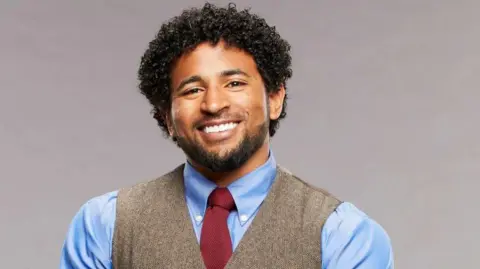Would-be reality TV contestants ‘not looking real’
 Valerie Penso-Cuculich
Valerie Penso-CuculichValerie Penso-Cuculich knows a thing or two about picking contestants for reality TV shows.
She’s a casting director for such programmes as Love Island USA, The Real Housewives of Dubai, and The Millionaire Matchmaker.
Ms Penso-Cuculich says that AI has made her first contact with applicants far more complicated.
“Potential contestants are increasingly using AI on the photos they post on their social media,” she says. As a result, there is a big uptick in over-filtered images, and people not looking real.
“My main mission is to cast real people, and that makes it hard to wade through that excessiveness. When people show up on Zoom for an audition, I’m not necessarily getting what I expected to see.”
On a positive note, Ms Penso-Cuculich adds that AI has greatly sped up the process of transcribing the raw footage from the interviews of applicants.
Traditionally, this was a time-consuming experience, with a person having to type out the spoken words. Now it can be done automatically using AI.
“And if I am looking for a specific soundbite, I don’t have to listen to the whole contestant interview, I can use an AI app to do a search for what I need. This definitely has saved me time.”
As the reality TV sector increasingly has to deal with the good and bad impacts of AI, lawyer John Delaney says there are growing legal and regulatory issues.
“For example, AI could be used to suggest scenarios or storylines, to edit episodes and to anticipate and assess audience reactions to in-show developments,” says Mr Delaney, who is a partner at commercial law firm Perkins Coie, and who advises companies on AI and other technology issues.
“However, production companies will need to consider to what extent the new Writers Guild of America agreement [to strictly restrict the use of AI] might limit their ability to use AI in connection with their reality TV programs.”
He adds that away from making the shows a growing issue that reality TV producers and contestants are facing is a proliferation of unauthorized, AI-generated images and videos.
Mr Delaney points to generative AI tools such as chatbot ChatGPT being used to create new content from reality TV footage.
“AI tools will allow both well-intentioned fans, and bad actors, to manipulate reality TV clips and entire episodes, and ultimately, to even create new works featuring reality TV stars and other celebrities,” he says.
One major hurdle for reality TV stars, and other celebrities, seeking to stop unauthorised, AI-created usage of their persona is that there is currently no comprehensive US federal law addressing deepfakes.
It is a similar situation around the world.
Mr Delaney highlights reality TV star Kyland Young who took part in the US version of Big Brother and The Challenge.
Mr Young is suing an AI-powered app called Reface, which allowed users to make photos that swapped their face for his. The lawsuit has yet to go to trial.
 Kyland Young
Kyland YoungMandy Stadmiller writes a Substack called Ignore Previous Directions, which focuses on “how to thrive and survive in the creator economy with AI”.
She says that Mr Young’s legal case is “important, because it centres around the right of publicity… and allowing reality stars to be able to control the exploitation of their identity”.
Where Ms Stadmiller says things get more complicated is the increasing use of AI as a plot tool within reality TV shows.
She points to recent Netflix dating show Deep Fake Love, which used deepfake technology to convince contestants that their partners were cheating on them.
“I can’t help but wonder what other forms of psychological trauma and torment will be deemed acceptable to deepfake in just a few years from now for the sake of entertainment,” she says.
However, grim as this all sounds, Ms Stadtmiller points out that it is important to look at the difference between “good deepfakes” and “bad deepfakes”.
“While a bad deepfake makes people do horrifying things like, say, cheat on someone they love, a good deepfake would be a video that can, for instance, instantly translate a reality star’s voice into another language,” she says.
“This is a helpful use of the AI technology for bridging language barriers.”
Meanwhile, the latest season of the US version of Big Brother has an AI focus. This includes a talking AI participant who appears in human form on a screen.
“Reality TV is almost always about reflecting our worries, obsessions and aspirations,” says David Nussbaum, whose firm Proto is behind the AI technology.
“We see AI tech all over the news… but its use on a show of this scale puts it in the minds of millions who will experience it, debate it, learn about it in a new way.”
 Jill Zarin
Jill ZarinJill Zarin is a reality TV star who has now embraced AI. Ms Zarin, who appeared in three seasons of The Real Housewives of New York City, has gone on to own a number of lifestyle brands.
Ms Zarin recently created a digital twin of herself thanks to AI cloning website Delphi.
Members of the public can go to her page on the Delphi website, and ask her questions for free. Her clone will then reply in via text, or, if you prefer, out loud in a copy of her voice.
Ms Zarin described the AI as a “walking encyclopedia” of her own thoughts and advice.
“It’s amazing to see how consistent my messages have been, even though my thoughts on different topics have evolved over the years.”
Delphi enables celebrities to monetise their clone in a number of ways. They can make it a paid-for service, or use the replies to advertise products, or include links to retail sites.
“Reality stars are people who get a ton of inbound – from media and from fans,” says Delphi chief executive Dara Ladjevardian.
“Digital clones can handle a lot of the outreach for these stars, answer questions that have already been answered several times. The clones also may remember things that reality stars might not remember in the middle of an interview.”
Yet while some in the reality TV community are embracing AI, others such as veteran producer Alex Baskin are not.
“At its best, reality TV captures the human experience, and I don’t see that changing,” says Mr Baskin, who is behind such shows as Real Housewives of Beverly Hills, and Real Housewives of Orange County.
“Reducing entertainment to an algorithm hasn’t worked over time, and I don’t see it working going forward.
“Human beings, with all of their interests, quirks and imperfections, are featured in the shows, and on the production side, and they come up with and make the shows in the first place. And that will continue.”









